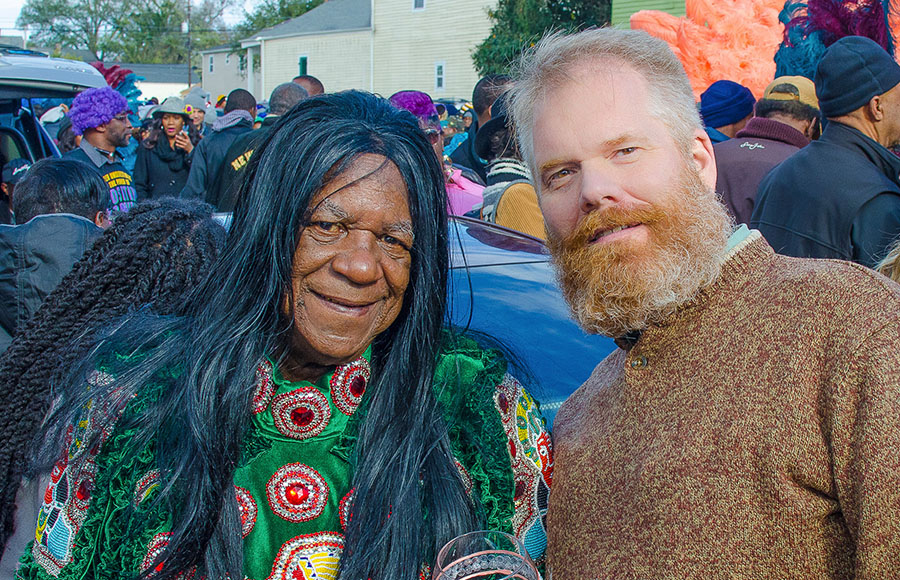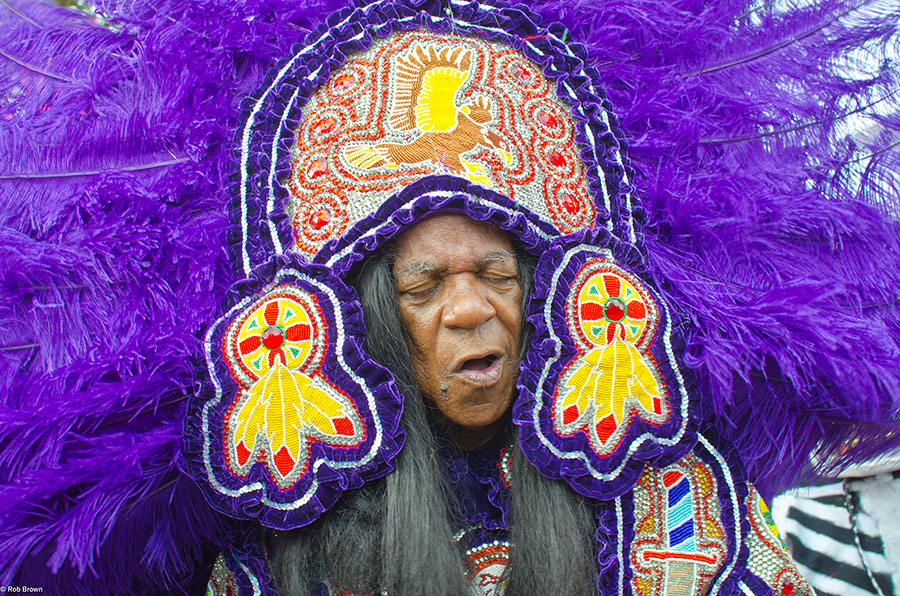Appalachian State University's Dr. Rob Brown is a cultural geographer who researches aspects of the Deep South – for example, black in-migration patterns since the 1970s, New Deal farm settlement and blues music.
As a doctoral student in Louisiana State University’s Department of Geography and Anthropology, he said he “fell under the spell of” professor Dr. Miles Richardson, a cultural anthropologist and ethnographer who taught him it’s possible “to tell deeper stories, richer stories” than typically explored in geography’s quantitative research tradition.
One deep, rich story he’s been spotlighting about people and place is the Mardi Gras Indians subculture of black New Orleans. In particular, he’s researched Pierre “Big Chief Monk” Boudreaux, who recently – thanks to Brown’s nomination – received a National Endowment for the Arts National Heritage Fellowship recognizing artistic excellence and contributions to the country’s traditional arts heritage.
Who are the Mardi Gras Indians?
The Mardi Gras Indians “emerged in the late 19th century, appearing as various ‘tribes’ or ‘gangs,’ in stunningly elaborate costumes, or ‘suits,’ that combine the visual aesthetics of American Plains Indians and Afro-Caribbean Carnival revelers,” according to Brown.
Within this culture, Boudreaux has distinguished himself as a folk artist and dynamic performing musician who blends folk traditions with rhythm and blues and funk. His musical career spans nearly 50 years, from the streets and clubs of his hometown to Carnegie Hall, Lincoln Center and venues in Europe and Asia. He has recorded critically acclaimed albums and appeared as a guest musician on others. He recently portrayed himself in the HBO television series “Treme.”
Boudreaux was one of nine recipients honored in September 2016 in the Library of Congress in Washington, D.C., alongside a Dakota flute maker, master shipwright, Laotian khaen player, Appalachia basket weaver and other artists.
“Here I was in this ornate hall thinking, all these cultures – Monk and all these guys who were just doing their thing in the hills of Kentucky or neighborhoods of New Orleans or small towns out in South Dakota, these everyday folk – now were being honored in this most fantastic of spaces at the highest government level,” Brown said. “It’s like finally the country looks to people at the grassroots level and says, ‘You matter. You are one thing that makes the United States so unique.’”
Brown wants to share that distinctiveness with others. “I get gratification from shining a light on a unique American culture, especially in this time when American culture seems to be becoming homogenized,” he said.
Geography as cultural exploration
As an ethnographer, Brown said he asks himself, “‘Who am I to come into these communities and impose myself, taking pictures and writing about that?’ Having lived in the Mississippi Delta, which is one of the poorest areas of the United States, and to see the racism and the economic and social marginalization people were having to live with, I was drawn to this rich cultural tradition. It just seemed to me the poverty covered up this richness of culture.”
Brown continued, “Geography encompasses so many areas. (The discipline is) built on space and location, and you can apply space and location to endless topics.”
What do you think?
Share your feedback on this story.
About the Department of Geography and Planning
The Department of Geography and Planning promotes the understanding of the spatial dimensions of human behavior within the physical and cultural systems of the earth, and the role of planning in achieving improvement in those systems. The department offers degrees in geography and in community and regional planning. Learn more at https://geo.appstate.edu.
About the College of Arts and Sciences
The College of Arts and Sciences (CAS) at Appalachian State University is home to 17 academic departments, two centers and one residential college. These units span the humanities and the social, mathematical and natural sciences. CAS aims to develop a distinctive identity built upon our university's strengths, traditions and locations. The college’s values lie not only in service to the university and local community, but through inspiring, training, educating and sustaining the development of its students as global citizens. More than 6,800 student majors are enrolled in the college. As the college is also largely responsible for implementing App State’s general education curriculum, it is heavily involved in the education of all students at the university, including those pursuing majors in other colleges. Learn more at https://cas.appstate.edu.
About Appalachian State University
As a premier public institution, Appalachian State University prepares students to lead purposeful lives. App State is one of 17 campuses in the University of North Carolina System, with a national reputation for innovative teaching and opening access to a high-quality, cost-effective education. The university enrolls more than 21,000 students, has a low student-to-faculty ratio and offers more than 150 undergraduate and 80 graduate majors at its Boone and Hickory campuses and through App State Online. Learn more at https://www.appstate.edu.













